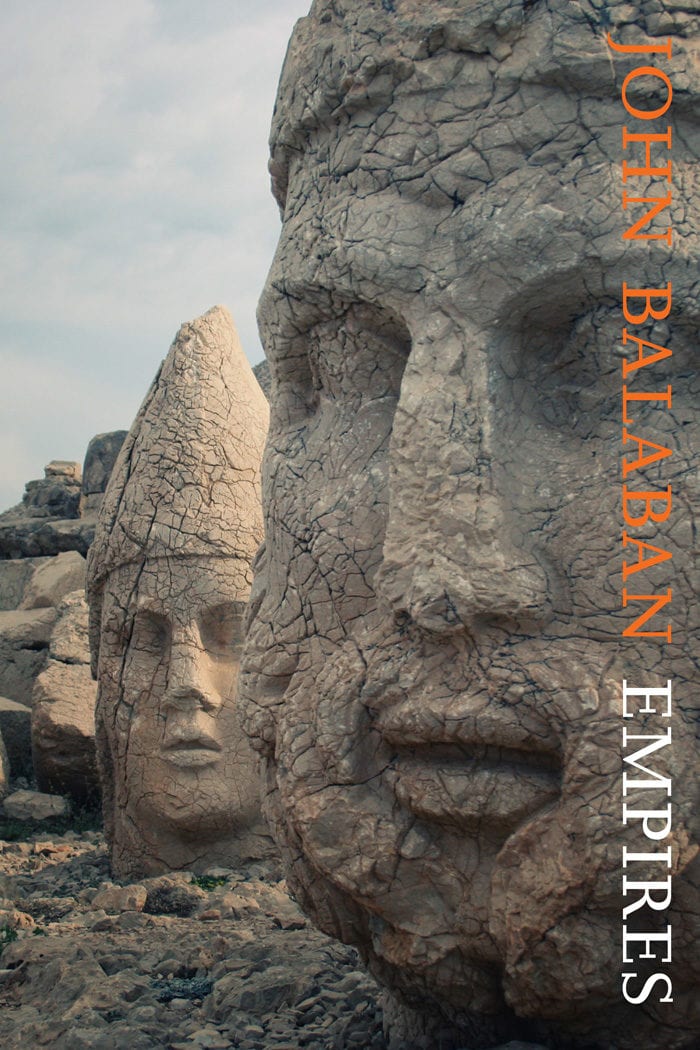
Empires, John Balaban’s eighth poetry collection, moves around the globe through time, alighting on key moments of cultural change and personal revelation. From Ancient Ionia, to Viking traders on the Volga, to Washington’s troops crossing the Delaware, to a Romanian poet in Paris waiting for the Nazis to take him away, to the rubble of the World Trade Center, to a train ride through Dixie after the election of President Barack Obama, Balaban looks at moments of imperial shift. With the attention of a documentary filmmaker, and in deeply lyrical spells of longing and marvel, he considers the world in its innate beauty and complex ugliness. Balaban’s genius—as a world-renowned poet, translator, and activist—is in naming what binds us, connecting the dots of history.
ISBN: 9781556595707
Format: Paperback
Reviews
“Written with a storyteller’s verve, this collection entertains as it provokes and will appeal to may readers.” —Library Journal
“Balaban expresses a shrewd understanding of how the world works, and a clarion respect for life.” ―Booklist, starred review
“At its best, John Balaban’s Empires shows an exceptional poet growing still better in his seventh decade. Taken altogether, it is a strong piece of work that rises, at times, to that level at which reviews cannot do justice.” —Eclectica
“In his new book, Empires, [Balaban] once again demonstrates a piercing moral vision of humanity broken by colonialism and war and ethnic violence, yet he also offers possibilities for healing.” —Los Angeles Review of Books
“Balaban’s language is lyrical and lovely, lifting us beyond the morass of our complicated lives, instilling in our hearts the hope of an exalted existence here on earth.” ―W.S. Merwin
“Balaban has long been one of our finest poetic craftsmen working in the lyric mode. In his latest collection, Empires, Balaban once again demonstrates why he is celebrated as a major American poet.” —War, Literature, and the Arts
“I could not put Empires down. Balaban presents the distant past as though it is right there before us, and the present with renewed understanding. ‘Gods and Empire.’ ‘Returning After Our War.’ The insights are this-minute fresh, the language invigorating.” —Grace Schulman
“In a way that few poets do, John Balaban truly roams the globe—and the centuries. He has his eye on empires, yes, but also on moments when different slices of history collide… His capacious poems enlarge our eyes on the world.” —Adam Hochschild
“In these poems, John Balaban plumbs the recent and ancient past. His generous spirit and technical brilliance cast a very bright light. Empires is luminous work.” —Elizabeth Farnsworth
“Balaban is a traveler through history and places at home and abroad, writing in a personal voice that has an uncanny ability to imagine the lives of others. His poetry comes from a deep reading of literature—among other things, he is a renowned translator of Vietnamese poetry—and a willingness to go out into the world to see things for himself.” —PBS NewsHour
“Balaban juggles all of these angles with elegance and poise, without falling prey to exoticism, or orientalism, or whatever one calls it when a writer distorts another culture through the prism of his own limited, and limiting experience.” ―Prairie Schooner
“His journey suggests a moral urgency—the soldier mugged in the bus station, a legless vet in the nowhere gas station, the exiled Slavic poet tossing back vodkas in Paris—and is conveyed with wry narrative lyricism, juggling light and dark. The poems encompass both our bleakest times and the fugue of intertwining spirits, charged music we long to hear.” ―Artcetera, Nevada Arts Council
“The tensions of Balaban’s subjects—moral, philosophical, political, or even domestic—shake with their own music, whether the framework contains serenity or agitation, as the poems submit their lyrical force in defiance of irony, and even of terror.” —The Massachusetts Review
“John Balaban creates worlds within worlds in his latest collection, Empires. Each poem is enriched by cultural images that compel us to dive into their landscapes and experience unusual scenery so engaging that they become special worlds of multifaceted delights.” —New York Journal of Books
“John Balaban’s Empires is a superb late achievement by a major American poet. Cosmopolitan and deeply learned, compelling both as narrative and music, the poems of Empires are also pervaded by the moral seriousness that has characterized this poet’s work from the beginning… [Balaban] remains, as Empires confirms, a poet of extraordinary range, fluency, and erudition.” —Literary Matters
“…Empires, is an engaging, invigorating, expertly-crafted collection that manages to speak simultaneously to and of our time as well as of the great span of history that has brought us to this moment… Even in his most intimate, tenderhearted poems, the writing is almost self-effacing in its poise and balance, well-wrought and clear… This is poetry of high craft and artistry, work that will last…” —NewPages Blog
“Viscerally compelling… Though his poems span centuries and cultures, Balaban investigates the meaning of empire by focusing on quotidian moments, by sorting through the rubble of collapsing cultures to find images and language that can bind us. His poems do not recoil from ugliness, but seek to understand how, from the tragedy of human history, a meager redemption might be possible.” —The Hopkins Review
“In Empires, Balaban tracks empirical shifts during key historical instances—such as Washington crossing the Delaware or the fall of the World Trade Center—in order to surgically locate intersections of beauty, ugliness, and understanding. The poet’s technical precision and mastery of voice moves the narrative from rubble and desolation to quiet moments of triumph, solitude, and peace.” —Pinyon
As featured in:
PBS NewsHour, “We read these 29 books in 2019. You should too.”
